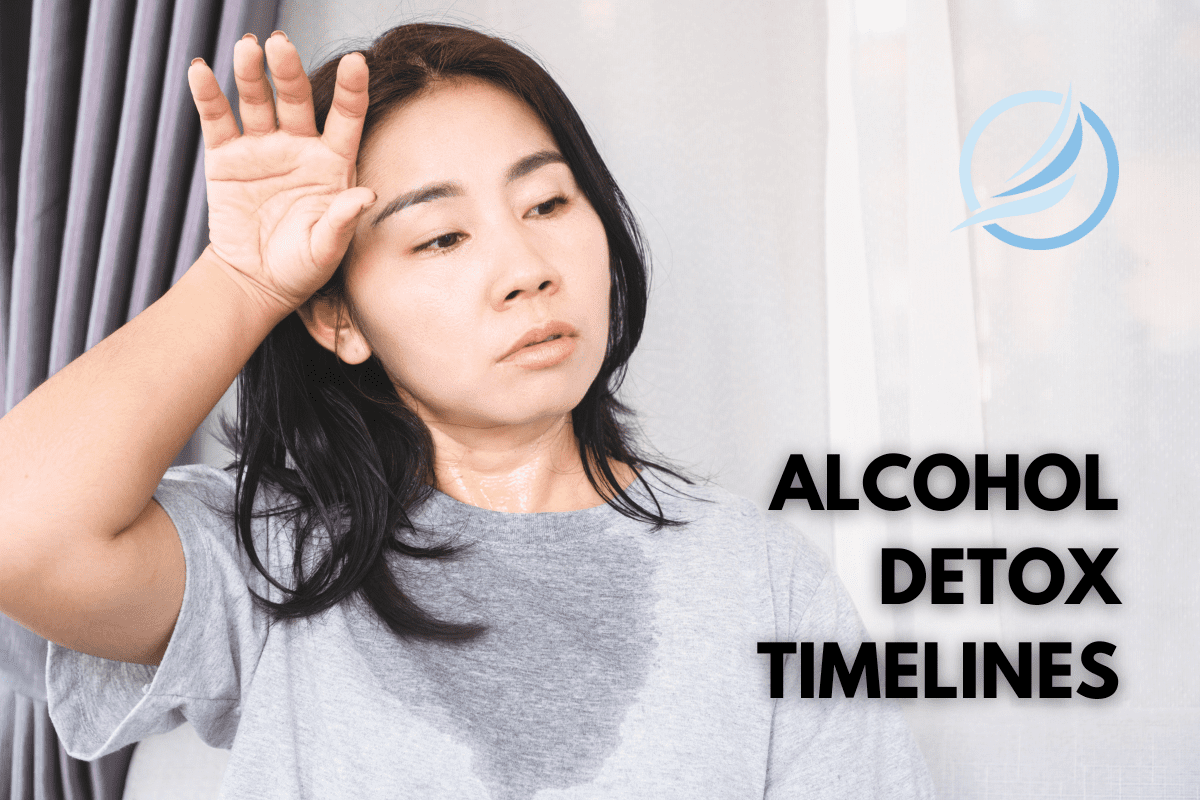One of the early steps of treatment for alcohol use disorder (AUD) is detoxification. When you stop drinking alcohol after a period of addiction, your body experiences withdrawal, and this temporary adjustment results in uncomfortable physical and mental symptoms. How long it takes to go through alcohol withdrawal depends on various factors, but in most people, it lasts up to a week.
Undergoing withdrawal under medical supervision is known as detoxification or detox. The exact time it takes to go through detox depends on factors like your age, weight, how long you’ve been taking alcohol, and whether you have medical conditions related to alcohol abuse.
Considering these factors, let’s explore the typical length of an alcohol detox and what type of detox is best for your needs, helping lay a solid groundwork for long-term abstinence.
What Is Alcohol Detox and How Does it Work?
Alcohol detoxification or detox is the process of undergoing medically supervised alcohol withdrawal. During alcohol detox, professional staff monitor your withdrawal symptoms and help you reduce its effects and potential complications. The goal is to get you through the risky withdrawal period as safely and comfortably as possible.
Most alcohol detox programs involve the following stages:
- Assessment: Medical professionals assess your physical and mental health to create a personalized plan for your needs.
- Stabilization: This is the medically supervised withdrawal, where medical staff attends to your needs as you experience symptoms. Sometimes, treatment involves sedatives like benzodiazepines.
- Post-withdrawal Treatment Plan: After your condition stabilizes, you will likely need to continue your treatment in outpatient or residential rehab. Additional treatment helps you get to the root of your alcohol use and make the necessary lifestyle changes to overcome it.
Detox is an effective first step to recovery. Still, it must be part of a long-term, comprehensive treatment plan to be effective.
Alcohol Detox Timeline
Alcohol detox can last as short as a few hours or as long as several weeks. Your level of alcohol consumption, overall health, age, and genetic predispositions influence the severity and length of your withdrawal symptoms.
The exact timeline for alcohol withdrawal varies individually, but the following timeframes are a good rule of thumb to consider:
- First 8 Hours After the Last Drink: Withdrawal symptoms usually start within 8 hours of the last drink. Symptoms of restlessness, pale skin, irritability, nervousness, lack of appetite, tremors, and nausea gradually appear.
- 12 -24 Hours After the Last Drink: More noticeable symptoms appear during this timeframe, including mood swings, profuse sweating, depression, brain fog, headaches, vomiting, and more. People who experience hallucinations during alcohol withdrawal usually start experiencing them within 24 hours.
- 24 – 72 Hours After the Last Drink: This timeframe is usually when symptoms become the most severe, and delirium tremens are more likely to set within this timeframe. Symptoms include nausea, vomiting, tremors, agitation, seizures, and hallucinations.
- 72+ Hours After the Last Drink: Symptoms usually start to subside gradually after three days, but some people may experience longer withdrawal syndrome.
People who experience mostly mild symptoms may be fine with a visit to their primary care provider, followed by virtual checkups to monitor the evolution of the symptoms.
For more severe symptoms, some may require hospitalization, where nurses, doctors, and other medical professionals will monitor vital signs (blood pressure, heart rate, temperature, etc.) and administer medication as necessary.
Post-Acute Withdrawal Syndrome (PAWS) Treatment
PAWS is a protracted series of milder symptoms that come after you’ve gone through the most intense withdrawal symptoms of the first week. Though there aren’t many studies on PAWS as a whole, alcohol-related PAWS symptoms are well-documented and may persist for up to 3 years after you stop drinking alcohol.
Common alcohol-related PAWS symptoms include the following:
- Mood swings
- Anxiety
- Irritability
- Fatigue
- Impaired ability to focus
- Alcohol cravings
- Low libido
- Insomnia
- Unexplained and potentially chronic physical pain
Managing and overcoming alcohol PAWS requires a combination of the following treatment options:
- Medication-Assisted Treatment (MAT): Certain medications, such as naltrexone and acamprosate, help reduce alcohol cravings, supporting long-term abstinence.
- Psychotherapy: Cognitive-behavioral therapy (CBT) is very effective at teaching you how to cope with cravings, manage stress, and address underlying issues contributing to alcohol use.
- Support Groups: Non-professional groups such as Alcoholics Anonymous (AA) connect you with others who have gone or are going through their sobriety journey. They can help you build community, provide coping strategies, and keep you accountable.
- Lifestyle Changes: Regular exercise, better nutrition, and better sleep play a vital role in your recovery.
Types of Alcohol Detox
You can perform an alcohol detox as part of an inpatient or outpatient rehab program.
Inpatient Alcohol Detox
Inpatient detox for alcohol abuse involves a structured, residential rehab program where you receive intensive medical and psychological support to help you safely go through withdrawal syndrome.
You will undergo inpatient detox in a specialized clinical setting, where the hospitalization continues until your condition stabilizes. Healthcare professionals will constantly monitor your vitals and administer medication as needed.
Outpatient Alcohol Detox
On the other hand, outpatient detox takes place outside a hospitalization setting. It allows you to undergo detox while living at home and making regular visits to a healthcare facility where medical professionals monitor and support the withdrawal process.
Outpatient detox may still involve medications and psychotherapy while also providing greater flexibility by letting you attend to your daily responsibilities.
Is Inpatient or Outpatient Detox More Appropriate for You?
Inpatient treatment is more appropriate for you if you experience severe alcohol abuse that may lead to life-threatening withdrawal symptoms. It’s also best for you if you face co-occurring mental illness, lack a support system, or have found outpatient treatment to be insufficient. The structured environment provides a more intense treatment plan that will help you safely overcome withdrawal in a controlled setting.
In contrast, outpatient treatment is better if you need to balance everyday life and alcohol abuse recovery, especially if you enjoy a stable home environment and you’ve already successfully undergone inpatient treatment. It also works if you experience mild or moderate alcohol abuse that may not lead to life-threatening withdrawal symptoms.
Seek Treatment for Alcohol Abuse
Alcohol detox is the process of going through a medically supervised withdrawal, which can take anywhere from a few hours to several weeks, depending on various factors. In most cases, it lasts up to a week.
If you experience alcohol abuse, taking the first step in your recovery can seem overwhelming. Still, it’s important to remember that there is a life beyond drinking that you can rediscover, and you don’t have to do it alone.
Speak with a trusted friend or relative or bring the matter directly to your medical professional. The initial steps of alcohol abuse recovery, including detox, are the most difficult, but they will be worth it.


































